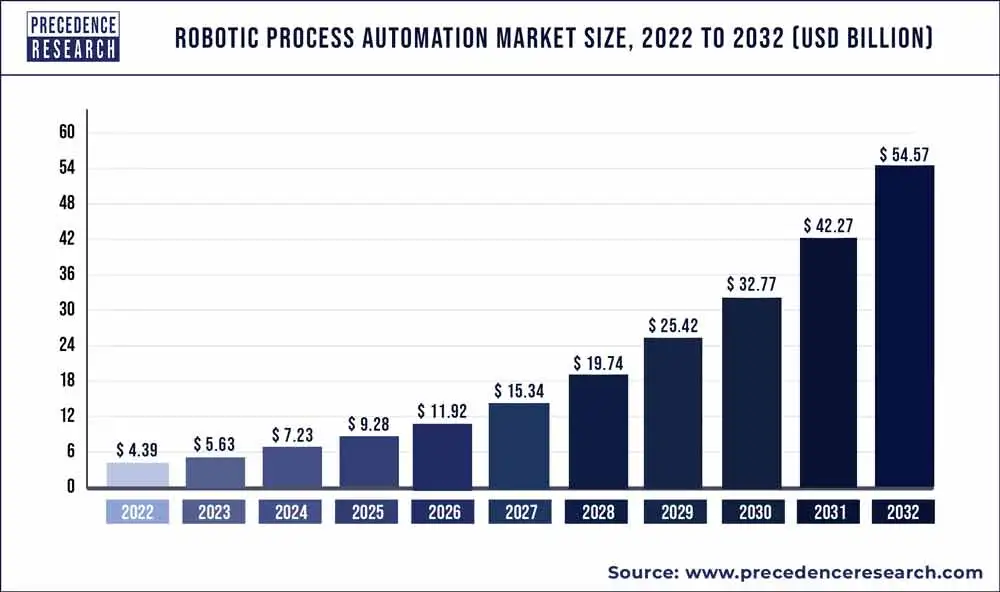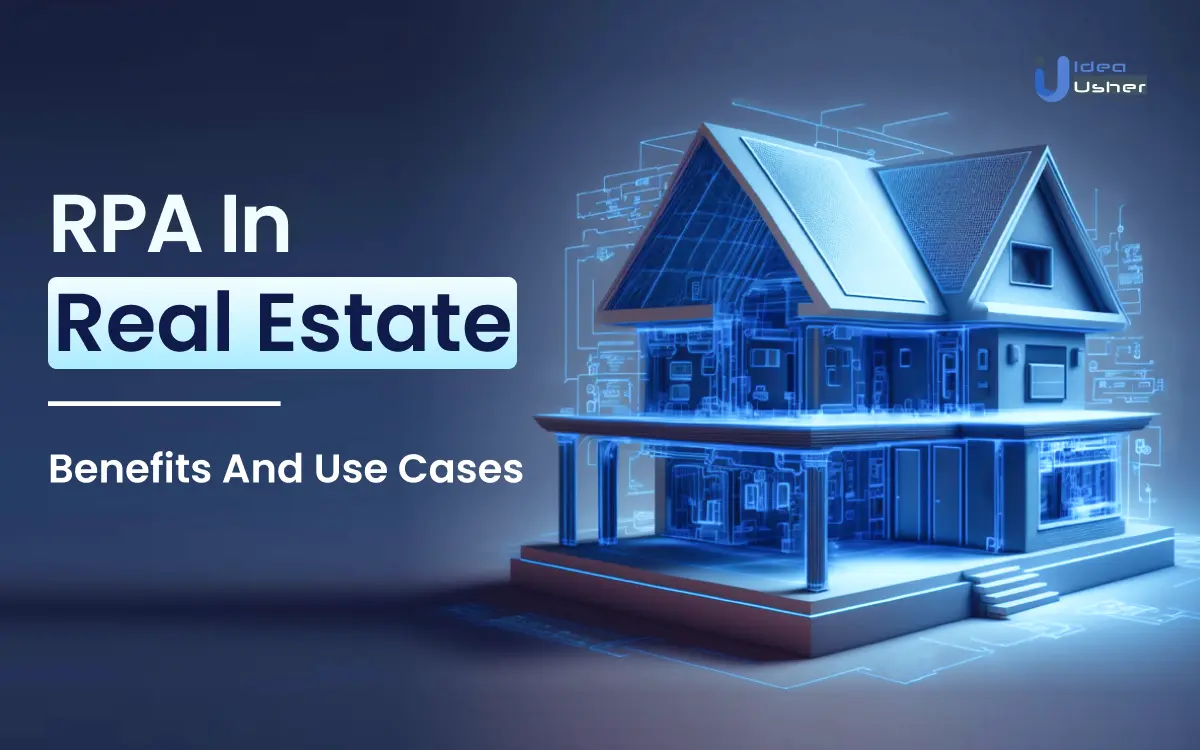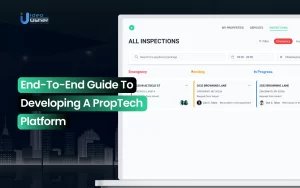Real estate and property management include a variety of data-intensive operations, including document management, inventory handling, and critical operational procedures such as procurement and accounting.
These responsibilities, which are based on documentation and rule-driven procedures, have the potential to inhibit employee and corporate productivity.
The development of Robotic Process Automation (RPA) technology provides a transformative solution. By automating 70-80% of rule-based procedures, the real estate industry’s rule-centric workflows make it a perfect option for optimizing operations.

Source: PrecedenceResearch
Giving regular duties to automated bots allows real estate agents to shift their emphasis to more important activities like closing transactions, providing customized help to homebuyers, and facilitating the best housing options based on budget and preferences.
In this blog, we will explore important aspects of RPA in real estate, such as steps in those cases, real-life examples, and challenges.
What Is RPA In Real Estate?
Robotic Process Automation (RPA) in real estate refers to applying automated software solutions to streamline and enhance various business processes within the real estate industry. RPA technology involves using software robots or “bots” to perform repetitive and rule-based tasks that humans traditionally carry out. These tasks may include data entry, document verification, invoice processing, and other routine administrative activities in the real estate sector.
One significant benefit of implementing RPA in real estate is the potential for increased operational efficiency. By automating time-consuming and repetitive tasks, organizations can reduce the risk of human errors, speed up processes, and allocate human resources to more strategic and value-added activities. For example, RPA can be utilized to automate the extraction and validation of property information from documents, such as leases or contracts, saving valuable time for real estate professionals.
Furthermore, RPA can improve compliance and accuracy in real estate transactions. The software robots can be programmed to follow predefined rules and guidelines, ensuring that tasks are performed consistently and by regulatory requirements. This not only helps in reducing compliance risks but also enhances the overall reliability of real estate operations.
In addition to administrative tasks, RPA can also play a role in customer interactions within the real estate industry. Bots can be programmed to handle routine customer inquiries, provide property information, and even assist in the initial stages of the sales or leasing process. This enhances customer service and allows human agents to focus on more complex and personalized aspects of client interactions.
RPA in real estate holds the potential to revolutionize operational processes by automating repetitive tasks, improving efficiency, ensuring compliance, and enhancing customer interactions. As technology advances, the integration of RPA is likely to become more widespread in the real estate sector, contributing to a more agile and responsive industry.
Business Benefits of RPA in Real Estate
From streamlining tedious tasks to enhancing operational efficiency, explore the pivotal role RPA plays in reshaping the real estate industry.
1. Enhanced Customer Experience
Robotic Process Automation (RPA) is pivotal in transforming the customer experience within the real estate and housing services sector. By automating routine tasks such as data entry, document processing, and customer information management, robots enable quicker responses to customer inquiries. Automated systems efficiently handle customer requests, ensuring timely and accurate responses. Moreover, RPA helps effectively manage customer feedback and satisfaction data. This ensures that real estate companies can promptly address customer concerns, improving overall satisfaction. The ability to process and analyze large volumes of customer data contributes to a deeper understanding of client needs, facilitating personalized services and enhancing the customer journey.
2. Increased Speed and Productivity
One of the primary advantages of implementing RPA in real estate and housing services is the significant boost in speed and productivity. Robots excel at handling repetitive and rule-based tasks with unparalleled efficiency. In real estate, where data processing is a substantial part of daily operations, RPA proves invaluable. It expedites tasks such as property valuation, document verification, and lease processing by rapidly processing large volumes of data or seamlessly transforming data between different systems. This increased speed enhances operational efficiency and ensures quicker turnaround times for critical processes, thereby improving the overall pace of business operations.
3. Employees Can Focus on More Valuable Tasks
By automating routine and mundane tasks, RPA liberates employees from the burden of repetitive work, allowing them to concentrate on more creative and value-added responsibilities. Real estate professionals can redirect their efforts toward strategic decision-making, client relationship management, and business development. Automating time-consuming tasks like data entry, invoice processing, and document handling ensures that human resources are utilized more effectively. This shift in focus from routine work to higher-value tasks improves job satisfaction and contributes to the real estate industry’s overall growth and innovation.
4. Higher Cost Savings
Cost efficiency is a compelling reason for the widespread adoption of RPA in real estate and housing services. Robots work tirelessly without breaks, reducing the time required to complete tasks and minimizing errors. This enhances productivity and leads to substantial cost savings in the long run. The initial investment in RPA technology is often outweighed by the immediate cost reductions achieved through streamlined processes and increased accuracy. The payback time for RPA investments is typically short, with companies experiencing a return on investment within a few months. This rapid cost recovery makes RPA an attractive proposition for real estate businesses looking to optimize their operations and enhance financial performance.
5. Improved Compliance and Accuracy
Real estate transactions involve many documents and legal requirements, making accuracy and compliance crucial. RPA ensures high accuracy by eliminating human errors in data entry and document processing. Automation also helps enforce standardized processes, reducing the risk of non-compliance with industry regulations. By consistently applying rules and regulations to each transaction, RPA mitigates the risk of legal issues and ensures that real estate companies adhere to industry standards. This enhances operational efficiency and instills confidence in clients and stakeholders, further bolstering the reputation and trustworthiness of the real estate and housing services sector.
Use Cases Of RPA In Real Estate
Let’s dive deeper into the applications and use cases of Robotic Process Automation (RPA) in real estate, focusing on the mentioned processes:
1. Automating Payment Reminders
Automating rent payment reminders is crucial for efficient real estate management. RPA can check incoming payments, verify payee information, and send timely email reminders to tenants. This improves the overall payment collection process and minimizes the emotional burden of managing late payments.
2. Streamlining Tenant Onboarding
RPA streamlines tenant onboarding processes by automating tasks such as creating new tenant applications, running background checks, and verifying income and references. By automating these rule-based tasks, RPA ensures a faster and more accurate onboarding process, reducing the risk of losing potential tenants to competitors.
3. Enhancing Portfolio Management
RPA aids in real estate portfolio management by automating the listing of sold-out or rented properties from ERP systems. This ensures that data on multiple websites is simultaneously updated, providing high visibility into existing properties. The automation of portfolio management tasks enables realtors to focus on strategic decisions, leading to more efficient and streamlined operations.
4. Accounts Payable (AP) / Accounts Receivable (AR) Automation
RPA, combined with hyper-automation technologies, enables nearly 80% no-touch automation for invoices submitted outside of Electronic Data Interchange (EDI). By incorporating machine learning and Optical Character Recognition (OCR), businesses can automate AP and AR sub-processes, enhancing data verification, balance sheet forecasts, and overall financial efficiency.
5. Optimizing NAV Calculations
Net Asset Value (NAV) calculations are vital in real estate investing. RPA can automate labor-intensive steps involved in NAV calculations, including collecting, validating, and processing market data. Real estate investors can achieve more accurate and timely NAV calculations by automating these tasks, allowing for better-informed investment decisions.
6. Ensuring AML/KYC Compliance
RPA plays a crucial role in Anti-Money Laundering (AML) and Know Your Customer (KYC) compliance. Bots can validate customer data on transactions, extract data from various ERP sources, and autonomously verify customer information. This enhances compliance and reduces the risk of fraud by minimizing human contact with sensitive data.
7. Simplifying Bank & Account Reconciliation
RPA simplifies bank and account reconciliation by automating the extraction of bank statements from different banks associated with real estate firms. These statements are then reconciled with general ledger entries, ensuring accuracy in financial records. The streamlined reconciliation process improves financial transparency and reduces the likelihood of errors.
Real-life Examples Of RPA In Real Estate
Robotic Process Automation (RPA) has emerged as a transformative technology, streamlining repetitive tasks and enhancing operational workflows. Explore real-life applications of RPA in the real estate sector through the following illuminating examples.
1. WAM Group

WAM Group, a prominent player in the fractional ownership market in Brazil, embraced a cloud-based Robotic Process Automation (RPA) solution to optimize various departments within the organization. The finance, tax, and research departments saw substantial improvements in their processes after the implementation of RPA. The cloud-based RPA solution streamlined workflow and resulted in significant cost savings. The organization reported $1 million in savings, showcasing the tangible financial benefits of integrating RPA into their real estate operations.
2. Deloitte

Deloitte, a global consulting firm, partnered with a multinational real estate company to implement RPA bots in their operations. The focus was on accelerating tasks related to tax billing and maintenance. RPA bots were employed for reporting, data extraction, and data manipulation tasks. The impact was remarkable, with the reporting time slashed from 45 hours to just 1 hour. Deloitte’s successful integration of RPA demonstrated how automation could enhance efficiency and reduce time-consuming processes in the real estate sector.
3. Sunway Group

Sunway Group, one of Malaysia’s leading real estate companies, adopted an AI-powered RPA solution to enhance efficiency across 35 business operations. The implementation significantly reduced processing times, demonstrating the potential of combining artificial intelligence and RPA in real estate processes. Sunway Group reported a remarkable 30% decrease in processing times after implementing the RPA solution, showcasing the positive impact on operational speed and overall productivity.
4. Hoas

The Foundation for Student Housing in the Helsinki Region, known as Hoas, leveraged RPA software robots to streamline and expedite their housing application processes. The RPA implementation led to a nearly 50% reduction in the time required to handle 8,400 housing applications. The success of this implementation highlighted the adaptability of RPA in diverse real estate-related tasks, from application handling to data processing. Hoas reported a significant decrease in processing time, making their operations more efficient and responsive to the needs of students seeking housing.
Challenges Of Implementing RPA In Real Estate
Implementing Robotic Process Automation (RPA) in the real estate industry is challenging. This section will explore the complexities and hurdles of introducing RPA solutions in the dynamic real estate landscape.
1. Integration with Existing Systems
In addition to compatibility issues, ensuring seamless integration with diverse systems is critical. RPA often faces challenges when dealing with legacy systems or proprietary software, requiring thorough analysis and potential customizations. Organizations need to invest time and resources in understanding the intricacies of their existing software landscape to ensure a smooth RPA implementation.
Moreover, while major RPA platforms offer pre-built integrations, the complexity arises when dealing with niche or industry-specific software. Custom integrations may demand specialized knowledge, potentially leading to delays and increased costs. Collaborating with experienced RPA implementation teams is essential for navigating such integration challenges effectively.
2. Scalability
As organizations expand, RPA systems must adapt to handle increased data volumes and evolving processes. Failing to plan for scalability from the outset can result in performance issues and decreased efficiency. Smaller organizations face the dilemma of allocating resources for additional robots as a solution, but this approach needs to be revised in the long run.
Efficient scalability requires strategic planning and collaboration between different departments. Implementing process mining tools can aid in identifying areas for improvement and optimizing workflows. Organizations should adopt a dynamic approach to distributing robots based on processing demands, ensuring scalability without compromising efficiency.
3. Infrastructure
The success of RPA implementation heavily relies on a robust IT infrastructure. Ensuring adequate processing power, storage capacity, and stability are imperative for RPA bots to operate efficiently. Security considerations, such as protecting sensitive customer data, further complicate infrastructure requirements.
Stability is crucial, and organizations must invest in failover mechanisms and measures to limit external influences on the RPA system. Implementing a comprehensive security framework, including unique credentials for each bot and regular script validation, becomes paramount to safeguard against potential threats.
4. Long-Term Maintenance and Monitoring
Post-implementation, continuous monitoring and maintenance are vital for sustained RPA performance. Changes in regulations, business requirements, and the tech stack necessitate regular adjustments to the RPA system. Without proactive monitoring, errors can arise, leading to disruptions in automated processes.
Automating maintenance operations, such as stress tests and data management, helps identify and address issues promptly. Designating an RPA owner responsible for overseeing the system’s condition ensures ongoing reliability. Regular performance checks and updates are essential for preventing the degradation of the RPA tool over time.
5. Change Management
Implementing RPA transforms technological processes and impacts people and existing workflows. Obtaining executive buy-in is crucial to influencing company culture positively. Failing to consider the human element can result in resistance or aversion to the new technology.
Treating RPA implementation as an opportunity to revisit and improve existing processes is essential. A clear vision of the benefits and improvements expected from automation can aid in aligning organizational goals with technological advancements.
6. Employee Resistance and Retraining
Resistance to change from employees is a common barrier in RPA implementation. Disruption to daily routines and the need to acquire new technical skills can lead to apprehension. Addressing these concerns requires effective communication, education about the benefits of working alongside bots, and emphasizing that RPA is a tool rather than a replacement for employees.
Investing in employee training programs helps bridge the skill gap and ensures a smooth transition to working with RPA. Clear communication on the role of RPA in enhancing job functions rather than replacing them is essential for building trust among employees.
7. Process Identification and Prioritization
Identifying suitable processes for automation is crucial for RPA success. Not all processes are suitable for automation, and attempting to automate unsuitable tasks can lead to project derailment. Understanding the limitations of RPA in handling highly complex or inconsistent tasks is essential for realistic expectations.
A clear objective for the automation project, along with prioritization of tasks, ensures that RPA efforts align with organizational goals. Avoiding a haphazard approach to process identification and prioritization enhances the efficiency and effectiveness of RPA implementation.
8. Cost and ROI Analysis
While RPA promises significant savings, organizations must conduct thorough cost and ROI analyses before implementation. Assigning RPA to tasks with the highest headcount might seem logical, but heavy workloads and exception handling can lead to project failures.
Underestimating implementation costs and neglecting long-term maintenance expenses can impact the perceived ROI. Decision-makers must carefully evaluate the balance between costs and benefits, considering license expenses, project complexity, and additional infrastructure requirements.
Auditing processes and seeking guidance from RPA consultants can contribute to a more accurate assessment of potential benefits, leading to a quicker and more sustainable ROI.
9. Regulatory Compliance
RPA involves processing sensitive data, making regulatory compliance a significant concern. Establishing governance rules for RPA, defining responsibilities, and ensuring secure data processing are imperative. Companies must implement authorization measures, such as secure passwords and two-factor authentication, to prevent data leaks or insider threats.
Long-term compliance requires continuous data usage monitoring and periodic security audits of automated processes. Adhering to legal requirements ensures that RPA implementation aligns with data protection regulations and minimizes the risk of non-compliance fines.
10. Cybersecurity Threats
Integrating RPA into the tech stack introduces new cybersecurity challenges. Organizations need to implement additional security measures to protect against potential cyber threats. Monitoring the use of sensitive data, minimizing third-party services, and encrypting data are essential practices.
Storing activity logs on separate systems enhances data integrity and ensures a secure audit trail. Proactive measures against cyber threats are vital to safeguarding business and customer information and maintaining compliance with industry-specific regulations.
How Business Can Implement RPA In Real Estate?
In this section, we will explore practical steps and strategic insights, offering a roadmap for businesses to harness the full potential of RPA in real estate.
1. Identifying Suitable Use Cases
In the real estate sector, the potential applications of RPA are vast. Property management processes, such as rent collection, lease renewals, and maintenance requests, can be automated to reduce manual effort and enhance accuracy. Customer management tasks, like updating client information, sending personalized communications, and managing leads, can benefit from RPA-driven workflows. With RPA handling list management, segmentation, and scheduling, email marketing campaigns can be streamlined. Document-intensive tasks like contract generation, verification, and compliance checks can also be automated to improve efficiency and reduce errors.
2. Market Trends and Expert Consultation
Staying abreast of market trends is crucial for maximizing the impact of RPA in real estate. AI development experts can provide insights into the latest advancements, such as intelligent automation, cognitive RPA, and predictive analytics. Integrating expert consultation into the implementation process ensures a tailored approach that aligns with industry-specific challenges. Furthermore, understanding emerging technologies like blockchain for property transactions or augmented reality for virtual property tours can complement RPA, creating a comprehensive and innovative real estate solution.
3. Minimum Viable Product (MVP) Development
Developing an MVP before full-scale implementation allows businesses to validate the chosen RPA use cases. For instance, in property management, an MVP could focus on automating tenant onboarding processes or rent payment notifications. The MVP might target automating lead scoring and follow-up communication in customer management. The MVP phase allows for user feedback, ensuring the final RPA-based real estate solution meets user expectations and operational needs. It’s a crucial step in refining the system architecture, ensuring scalability, and mitigating risks before widespread deployment.
4. Integration with Next-Gen Technologies
While RPA alone can offer significant benefits, integrating it with other next-gen technologies amplifies its impact. Natural Language Processing (NLP) can enhance customer interaction through chatbots capable of understanding and responding to inquiries. Machine learning algorithms can analyze historical property data, predict market trends and assist in strategic decision-making. Virtual reality (VR) or augmented reality (AR) technologies can revolutionize property showcasing, providing immersive virtual tours. This holistic integration ensures that the real estate solution not only automates processes but also embraces cutting-edge innovations for a competitive edge.
5. Agile Development Methodology
Adopting an agile development methodology ensures adaptability and responsiveness throughout the RPA implementation process. Regular sprint cycles allow for continuous feedback, facilitating adjustments based on evolving business needs. Agile practices also promote collaboration between development teams and stakeholders, fostering a transparent and efficient development process. This iterative approach minimizes the risk of feature misalignment, ensuring that the final RPA-based real estate solution is robust, user-friendly, and aligned with the dynamic requirements of the real estate industry.
6. Testing and Deployment
Rigorous testing is a critical phase in ensuring the reliability and effectiveness of the RPA-based real estate solution. Manual testing should cover various scenarios, including different property types, transaction volumes, and user interactions. Automated testing tools can assist in repetitive and complex test scenarios, guaranteeing the system’s resilience under diverse conditions. Once thoroughly tested, the deployment on a cloud platform ensures scalability, accessibility, and security. Additionally, incorporating monitoring tools post-deployment enables continuous optimization, ensuring that the RPA solution maintains peak performance and adapts to changing real estate dynamics.
Conclusion
Robotic Process Automation (RPA) emerges as a pivotal solution for real estate businesses seeking heightened efficiency, reduced costs, and streamlined processes. By deploying RPA bots, the industry can automate tedious and resource-intensive tasks, significantly saving time and money.
The benefits of RPA in real estate are multifaceted, ranging from accelerated task completion in a digital environment to enhanced precision in data entry and other crucial processes.
Beyond these advantages, the true value of RPA lies in liberating employees from time-consuming tasks, allowing them to redirect their focus and creativity toward more critical aspects of the business. As the real estate sector evolves, embracing RPA technology is a transformative step toward a more efficient and agile future.
How Idea Usher Can Assist In Implementing RPA In Real Estate?
With a decade-long experience in software engineering and AI development, Idea Usher can be your one-stop solution for implementing RPA in real estate. We can seamlessly design, develop, and deploy your custom RPA-based real estate solution while enhancing your business capabilities.
You get a wide range of professional AI development services, including (but not limited to) expert consultation, market research, competitor analysis, UI/UX, testing, app/software development, tech integration, and more.
Besides, we also offer a free, no-obligation quote to help you get an exact idea of your development cost and time.
You can read a case study about how we successfully implemented RPA solutions for our client’s business.
Fill out our consultation form to book a free expert consultation call.
Work with Ex-MAANG developers to build next-gen apps schedule your consultation now
FAQ
Q. What is the role of robotic process automation in the real estate industry?
A. Robotic Process Automation (RPA) plays a pivotal role in the real estate industry by automating repetitive and rule-based tasks, such as data entry, document processing, and communication. This technology streamlines workflows, reduces operational costs, and enhances overall efficiency. From managing property listings to automating lease agreements, RPA optimizes routine processes, allowing real estate professionals to focus on more strategic and value-added tasks.
Q. What is RPA in real estate?
A. RPA in real estate refers to applying Robotic Process Automation technology within the real estate sector. RPA involves using software robots or “bots” to automate routine and repetitive tasks, from data entry and document processing to communication and transactional processes. In real estate, this technology streamlines operations reduces manual errors, and accelerates various processes, ultimately improving productivity and enabling better resource allocation.
Q. What are some potential challenges of robotics in real estate?
A. While robotics in real estate brings significant benefits, there are potential challenges. The initial implementation cost is one challenge, as integrating RPA systems may require a considerable upfront investment. Additionally, adapting existing processes to the new automated workflows can pose a challenge, requiring proper training and change management. Another consideration is the potential for job displacement, as some routine tasks may be automated, impacting certain job roles. Businesses must address these challenges proactively and strategically to ensure a smooth transition and maximize the benefits of robotics in the real estate industry.

























